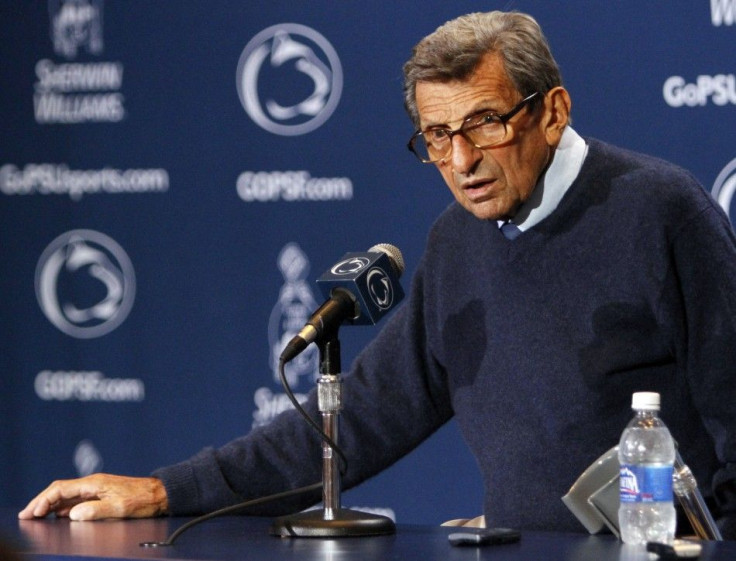Joe Paterno Death Sullied by Jerry Sandusky Statement
OPINION

Many athletes and coaches have issued statements about Joe Paterno's death on Sunday, but it is accused child molester Jerry Sandusky's statement that is making the most noise.
Paterno died on Sunday at the age of 85 from complications due to lung cancer. The long-time Penn State coach was fired on Nov. 9 for his lack of action when told allegations that Sandusky, a former Penn State defensive coordinator, was sexually molesting young boys on the Penn State campus.
Sandusky has been charged 52 criminal counts for sexually molesting young boys over a 15-year period. He has denied the charges in public interviews with NBC and The New York Times, but the amount of evidence against him is staggering.
That staggering amount of evidence is what led the Penn State Board of Trustees to make the decision to fire Paterno via a 10 p.m. phone call. In his last public interview with The Washington Post's Sally Jenkins, Paterno denied ever knowing of Sandusky raping a 10-year old boy, as has been alleged, but the school determined that his decision to not inform authorities of the molestation allegations was a valid cause for dismissal.
Sandusky's direct influence over the end of Paterno's career makes his decision to issue a statement on his death all the more confusing and frustrating.
Hundreds of former Penn State players and college coaches will weigh in on the coaching legend's death, but few expected the alleged child molester to issue a statement on the man who's career he destroyed.
This is a sad day! Our family, Dottie and I would like to convey our deepest sympathy to Sue and her family. Nobody did more for the academic reputation of Penn State than Joe Paterno, Sandusky said in an email through his attorney. He maintained a high standard in a very difficult profession. Joe preached toughness, hard work and clean competition.
Most importantly, he had the courage to practice what he preached. Nobody will be able to take away the memories we all shared of a great man, his family, and all the wonderful people who were a part of his life.
Sandusky has shown a shocking amount of delusion and lack of self-awareness in his public interviews, but deciding to issue a statement on Paterno's death is truly horrible.
Sports columnists will debate how we should remember Paterno's legacy for years to come, but the only reason it's even worthy of a debate is because of Sandusky. The reason why some believe the former Penn State coach's legacy was ruined is because of Sandusky. Further, the reason why Penn State football might struggle for years to come is because of Sandusky.
For Sandusky to sully Paterno's death by issuing his weak statement is pathetic. If Sandusky never did what he is accused of doing, we'd be remembering Paterno as a coach who won more games than anyone else in college football -- and not as an old man who didn't do enough to protect Sandusky's alleged victims.
In that last public interview, Jenkins said she gave Paterno every opportunity to attack Sandusky for his actions. But rather than attack him in a public forum, Paterno mostly avoided criticizing him by saying, Was he sick? I don't know. I don't even know if he's guilty.
He could have attacked him for his disgusting actions -- Sandusky has publicly admitted to showering with young boys and wrestling with them -- but he went the classy route instead.
It would have been nice if Sandusky did the same.
© Copyright IBTimes 2025. All rights reserved.





















